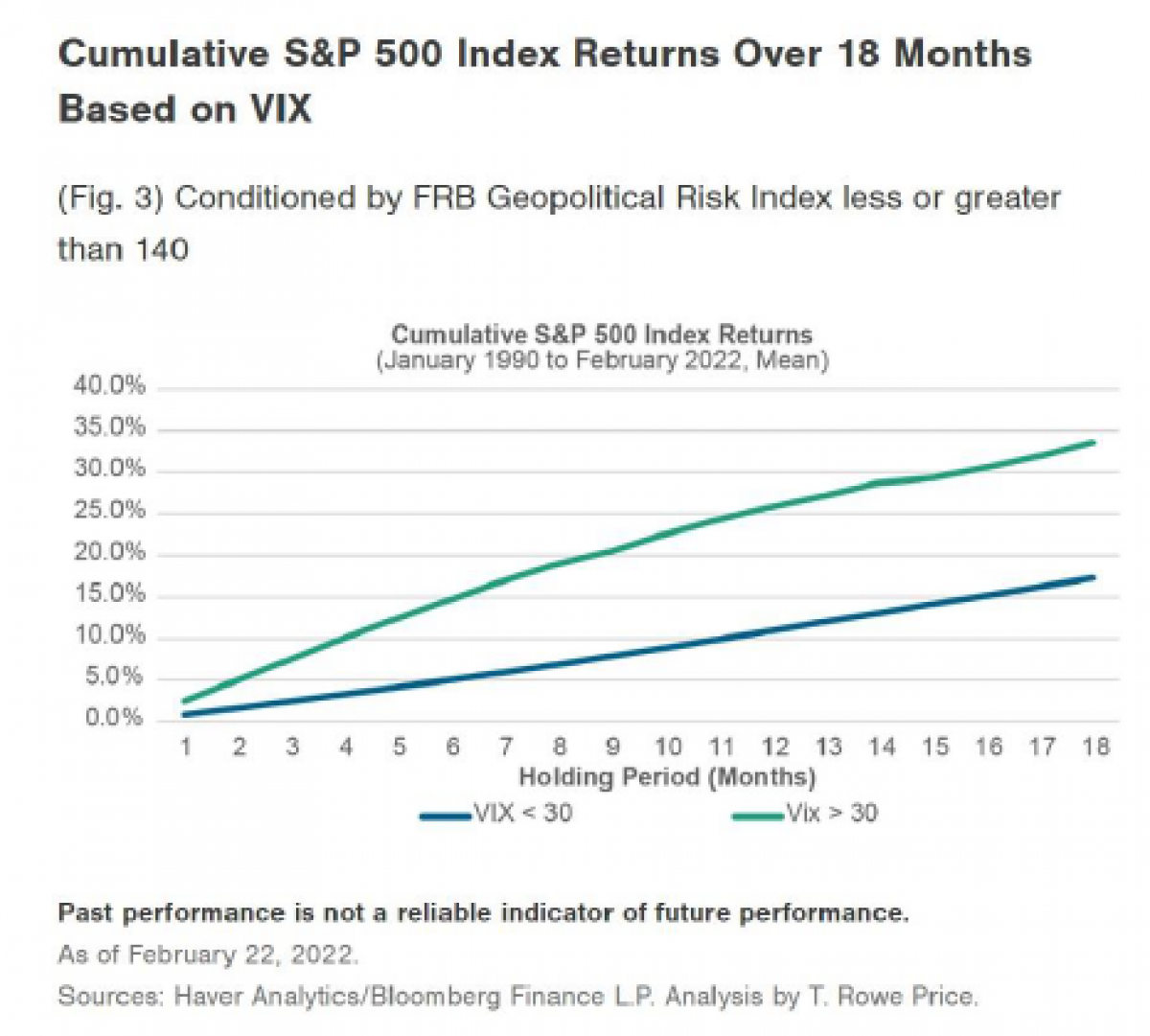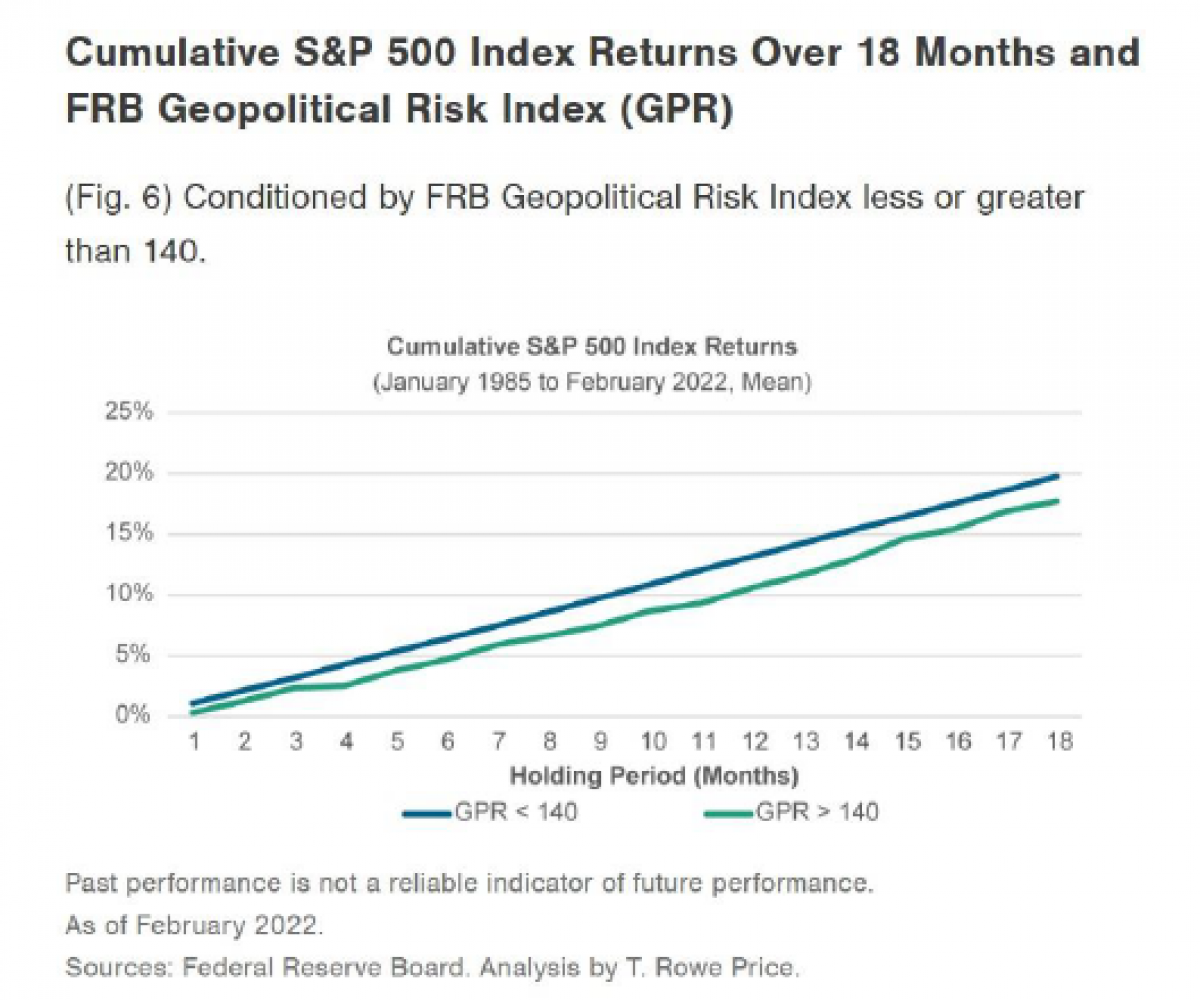
Returns and fear
Luigi Campopiano
When markets start to fall, the temptation to lighten the portfolio's equity component can be especially strong. Determining whether this is a clever idea is difficult because part of the answer depends on how much you can afford a large short-term loss. In general, however, those who can afford to wait for the recovery of the indices are rewarded.
This is what T. Rowe Price, an asset management company, did by observing what happened, historically, in the months following a peak in volatility. Although past performance is no indication of the future, over an 18-month horizon, U.S. stock returns have turned out to be markedly superior when preceded by a spike in investor fear.
For example, let’s review the performance of the New York Stock Exchange in two scenarios between 1990 and late February 2022. In the first, the VIX index — which indicates how much investors expect a stock to fall on the New York Stock Exchange a month later — was below 30 points at the initial time of the observation. In the second case, the scenario was that the stress of market participants is greater, and the VIX was beyond this threshold.
What emerged confirms how, on average, a spike in volatility tends to be followed by superior performance. The yields of the New York Stock Exchange, in the scenario in which the VIX was at the initial observation point above 30 points, were approximately double when compared to the other scenario at the end of the following 18 months. In addition, the probability of posting a positive cumulative performance over 12 months was greater than 90% when the VIX starting point was above 30. The percentage approaches 80% in the less strenuous initial scenario.
This observation seems to justify a more patient stance in the face of volatility or a bold buying approach in times of greatest tension.
This analysis suggested that volatility spikes are not a good signal to sell because returns tend to be above average in the 18 months following a volatility spike. Markets naturally tend to rebound after being oversold during the correction.
Investors need to stay disciplined and not panic sell, and those who do often only manage to lock in losses. Market timing, the practice of trying to buy and sell by promptly interpreting the current situation, is always difficult, even more so in times of severe stress and turbulence, because an investor who sells and moves into liquidity could re-enter the market late.
Conversely, periods of higher volatility can potentially provide investors with good longer-term entry points.
The analysis of the fear indicated by the VIX has proved to be a good anticipatory signal for the subsequent recovery of the market. On the other hand, much less so is the index on geopolitical tension elaborated by the Federal Reserve. The organization’s Federal Reserve Board Geopolitical Risk Index indicator depends on the results of an automated text search in the electronic archives of 10 newspapers, starting from 1985.
After reaching a peak, it does not show recoveries by the U.S. stock market in the following 18 months: there is no historical evidence that an increase in geopolitical risks could lead to strong forward returns.
The reason periods of heightened geopolitical risk are not typically good entry points for investors may be that few have insider knowledge of the duration or severity of geopolitical developments, so it may not be wise to use a geopolitical risk indicator such as a market timing signal.
 Related articles
Related articles
News 10 February 2025
Envista Holdings Corporation announced that the company will hold a Capital Markets Day on Wednesday, March 5, from 9:00 AM to 12:00 PM EST.
Market 29 November 2024
In financial markets, the butterfly effect is not uncommon—a phenomenon where small changes in conditions can lead to significant long-term variations in a system's behavior.
News 08 November 2024
The Belle Époque was a historical period characterized by economic growth, technological and scientific advancements, and significant improvements in living conditions, particularly for the...
News 09 August 2024
Over the past 15 years, Wall Street has dominated the global scene. The Morningstar US market index (including large, medium, and small companies) has more than quadrupled in value.
News 24 May 2024
Software of Excellence Partners With Pearl to Deliver Dental AI to the UK and Asia-Pacific Markets
Pearl announced that Software of Excellence, a leader in dental software, has selected Pearl as its new, exclusive dental artificial intelligence (AI) provider.
 Read more
Read more
Digital Dentistry 19 November 2025
Increasing awareness of tooth fracture, both complete and incomplete, as a significant disease entity has led to improved diagnostic techniques.
Editorials 19 November 2025
As Ellen Simmons-Shamrell of the Class of 1977 wrote her annual check for the Michael D. Scotti, DMD Endowed Scholarship—established in memory of her late classmate—she reflected on how different...
Products 19 November 2025
Smartee Denti-Technology has unveiled the Smartee Digital Orthodontic Technology Exhibition Hall, a 1,200-square-meter space dedicated to showcasing the company’s innovations in clear aligner...
News 19 November 2025
Coupa, the global leader in AI-powered spend management, today announced a new collaboration with Specialized Dental Partners, a premier dental support organization (DSO) dedicated to enabling its...
News 19 November 2025
Breakthrough T1D has been selected as a 2025 Health Access Hero Award grant recipient by Sun Life U.S. and DentaQuest.







.jpg)









